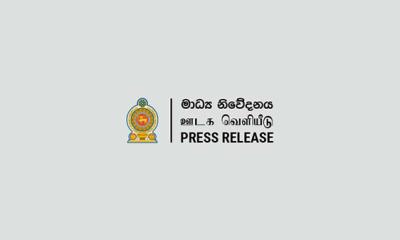News
Health experts call for enhanced trauma network and data-driven solutions to tackle high accident fatalities

By Rathindra Kuruwita
Despite the easy availability of the 1990 ambulance service, most people who have met with an accident are brought to the hospital by personal vehicles, Dr. Sajith Ranathunga General Surgeon at the National Hospital of Sri Lanka, said.
“Out of those vehicles, most are three-wheelers. When an accident happens, most people don’t know what kind of hospital they should be taken to. Staff in the 1990 ambulances know, but the average man on the street does not. We must educate Sri Lankans and create a system where everyone knows where to take a person who has met with an accident, based on the nature of the injury.”
Dr. Ranathunga said that the 1990 ambulance service has done a lot to minimize fatalities. He added that Sri Lanka has several types of hospitals, and hospitals like the Colombo National Hospital are tertiary care hospitals. The next rung of hospitals are district general hospitals, and they, too, have surgeons and emergency care departments.
“Then there are the base hospitals. These hospitals, too, have surgeons who take care of emergency situations. There are also hospitals that only have a general practitioner, and they take steps to transfer patients that need emergency care to a hospital with better facilities,” he said.
Meanwhile, Dr. Kirthi Abayajeewa, Consultant Surgeon at the Colombo National Hospital said Sri Lankan hospitals receive about seven cases of serious accidents that result in death. About 10 times more people become differently abled due to accidents. About 10 times that number of people suffer from minor injuries that do not require hospital visits.
These are high numbers, and we have been in this high range for many years. “There was a drop in accidents during COVID. But it has returned to the usual high rates following the lifting of lockdowns,” he said.
As a country develops, the number of people who die or get permanently injured reduces. However, in a country like Sri Lanka, fatalities that occur during accidents are higher than in a developed country, he mentioned.
Dr. Abayajeewa said that when it comes to motor accidents, ignoring road rules, the quality of roads, and vehicles, are the main reasons why most accidents occur and why there are higher fatalities. He said that recently they held a convention on accidents to share their knowledge among all stakeholders.
“We need to establish a trauma network covering all hospitals. This might cost a lot but is essential as we go forward.”
Dr. Gayan Ekanayake, Plastic Surgeon at the Colombo National Hospital, said the use of data and the application of data science in the management of injuries are low. “Everything depends on data. We need to immediately start collecting, analysing and using data to make key decisions on accident prevention as well as the management of accidents.”
Dr. Ekanayake said road accidents caused by violating road rules, injuries caused by those who are depressed, burn wounds, and violence that occurs due to domestic disputes, can be reduced with a change in attitude.
“I especially see interpersonal violence as a serious burden to the healthcare system. For example, a lot of people come in with injuries caused by sword attacks, and we have to do several surgeries that take over 12 hours. These are resource-intensive operations. The most striking feature is that most of these sword attacks have been done, emulating what people see in films. Resorting to violence has become normalized. We need to change our attitudes,” he said.
Domestic violence is also a serious problem. About 10 years ago, there were campaigns to deter domestic violence, and these programmes must continue because people tend to forget, he said. “The other problem is road accidents. Some people become speed demons once they get behind the wheel. They completely forget the risks involved in excessive speeding and violating traffic laws,” he added.
News
US sports envoys to Lanka to champion youth development

The U.S. Embassy in Colombo welcomed the U.S. Sports Envoys to Sri Lanka, former National Basketball Association (NBA) and Women’s National Basketball Association (WNBA) players Stephen Howard and Astou Ndiaye, from June 8 through 14.
The Public Diplomacy section of the U.S. Embassy said that it would launch a weeklong basketball program intended to harness the unifying power of sports, made possible through collaboration with Foundation of Goodness and IImpact Hoop Lab.
While in Sri Lanka, Howard and Ndiaye, both retired professional basketball players, will conduct a weeklong program, Hoops for Hope: Bridging Borders through Basketball. The Sports Envoys will lead basketball clinics and exhibition matches and engage in leadership sessions in Colombo and Southern Province for youth aged 14-18 from Northern, Uva, Eastern and Western Provinces, offering skills and leadership training both on and off the court. The U.S. Envoys will also share their expertise with the Sri Lanka Basketball Federation, national coaches, and players, furthering the development of basketball in the country. Beyond the clinics, they will collaborate with Sri Lankan schoolchildren to take part in a community service project in the Colombo area.
“We are so proud to welcome Stephen and Astou as our Sports Envoys to Sri Lanka, to build on the strong people-to-people connections between the United States and Sri Lanka,” said U.S. Ambassador Julie Chung. “The lessons that will be shared by our Sports Envoys – communication, teamwork, resilience, inclusion, and conflict resolution – are essential for leadership development, community building, equality, and peace. The U.S. Sports Envoy program is a testament to our belief that sports can be a powerful tool in promoting peace and unity.”
News
Rahuman questions sudden cancellation of leave of CEB employees

SJB Colombo District MP Mujibur Rahuman in parliament demanded to know from the government the reasons for CEB suspending the leave of all its employees until further notice from Thursday.
MP Rahuman said that the CEB has got an acting General Manager anew and the latter yesterday morning issued a circular suspending leave of all CEB employees with immediate effect until further notice.
“We demand that Minister Kanchana Wijesekera should explain this to the House. This circular was issued while this debate on the new Electricity Amendment Bill was pending. There are many who oppose this Bill. The Minister must tell parliament the reason for the urge to cancel the leave of CEB employees,” the MP said.However, Speaker Mahinda Yapa Abeywardena prevented Minister Wijesekera responding to the query and said that the matter raised by MP Rahuman was not relevant.
News
CIPM successfully concludes 8th Annual Symposium

The Chartered Institute of Personnel Management (CIPM) successfully concluded the 8th Annual CIPM Symposium, which took place on 31st May 2024. Themed “Nurturing the Human Element—Redefining HRM in a Rapidly Changing World,” the symposium underscored the pivotal role of human resource management (HRM) in today’s dynamic global landscape. Since its inception in 1959, CIPM has been dedicated to advancing the HR profession through education, professional development, and advocacy, solidifying its position as Sri Lanka’s leading professional body for HRM.
Ken Vijayakumar, the President of the CIPM, graced the occasion as the chief guest. The symposium commenced with the welcome address by the Chairperson, Prof. Arosha Adikaram, followed by the Web Launch of the Symposium Proceedings and Abstract Book by the CIPM President. The event featured distinguished addresses, including a speech by Chief Guest Ken Vijayakumar, President of CIPM, and an address by Guest of Honor Shakthi Ranatunga, Chief Operating Officer of MAS Holdings Pvt. Ltd., Sri Lanka.
The symposium also featured an inspiring keynote address by Prof. Mario Fernando, Professor of Management and Director of the Centre for Cross Cultural Management (CCCM) at the University of Wollongong, Australia.
Vote of Thanks of the inauguration session was delivered by Dr. Dillanjani Weeratunga, Symposium Co-chair.
The symposium served as a comprehensive platform for researchers to present their findings across a wide range of critical topics in HRM. These included Cultural Diversity and Inclusion, Talent Development and Retention, Ethical Leadership and Corporate Social Responsibility, Adapting to Technological Advancements, Mental Health and Well-being at Work, Global Workforce Challenges, Employee Empowerment, and Reskilling and Upskilling.
The plenary session was led by Prof. Wasantha Rajapakse. Certificates were awarded to the best paper presenters during the valedictory session, followed by a vote of thanks delivered by Kamani Perera, Manager of Research and Development.
The annual symposium of CIPM was a truly inclusive event, attracting a diverse audience that spanned undergraduates, graduates, working professionals, research scholars and lecturers. This widespread interest highlights the symposium’s significance in the field of HRM, offering a unique opportunity for everyone to network and learn from scholarly brains.The CIPM International Research Symposium was sponsored by Hambantota International Port, Sri Lanka Institute of Information Technology (SLIIT), E B Creasy & Co. PLC, and Print Xcel Company.
























